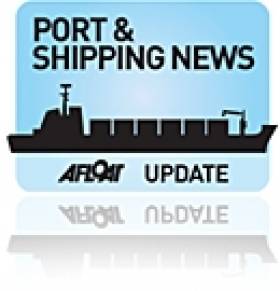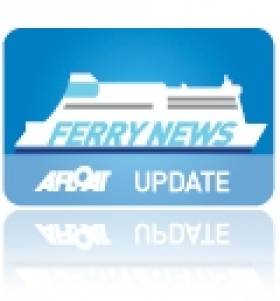Displaying items by tag: Swansea Cork Ferries
Swansea-Cork Ferry MV Julia For Sale
#SWANSEA CORK FERRY – The merchant ship MV Julia which operated as the Cork Swansea Ferry for the last two years is up for sale following the closure of The Fastnet Line ferry service and the loss of 78 jobs.
According to Dominic Daly Auctioneers the owners of the 1982–built vessel, a Finnish Bank, are inviting offers for the vessel on an 'AS SEEN AS IS' basis'. A guide price is expected shortly
As previously reported on Afloat.ie, the operator had been in examinership since last November, and a restructured business plan had been submitted with a view to resuming high-season service in April. However, in a statement the owners of the Fastnet Line said they had been unable to raise the €1m-plus investment required and that the examinership had "failed".
The ship is currently lying alongside at Cork Port.
The basic details of the vessel are as follows:
IMO Number: 8020642
Year of Build: 1982 (Germany)
Gross Tonnage: 22,161
DWT: 2,880
Net Tonnage: 8,921
LOA: 153.4
Length (BP): 136.02
Breadth: 24.24
Draught: 5.82
Height: 43.0
Displacement: 12,380
Passengers: Unberthed: 1,062
Cabins 344
Berths: 938
Crew: 110
Lorries: 110
Cars: 550
Ro-Ro Lanes: 710m x 5.20m 4.50m
Ramps: 1 Port 5.56 x 6.16 x 0
1 Starboard 5.56 x 6.16 x 0
1 Centre Or Only 9.95 x 6.68 x 0
Bow Door & Ramp, Stern Ramp
High Court Appoint Examiner to Cork-Swansea Operator
Mr Justice Peter Kelly appointed Michael McAteer of Grant Thornton interim examiner at a sitting of the High Court. Mr McAteer will present a progress report to the court on November 15.
The Fastnet Line companies are owned by the West Cork Tourism Co-Operative Society Limited, which was formed in April 2009. Over 400 members have invested funds in the venture which started in March 2010 following the closure of Swansea Cork Ferries which ran on the route until 2006.





























































